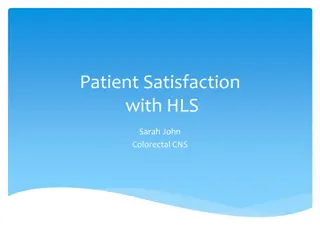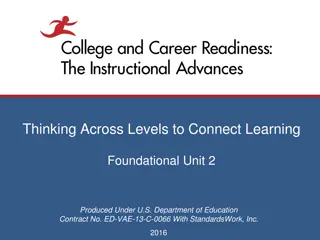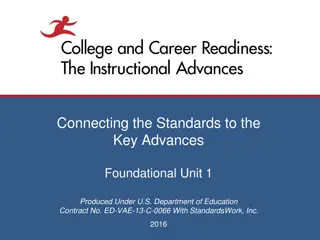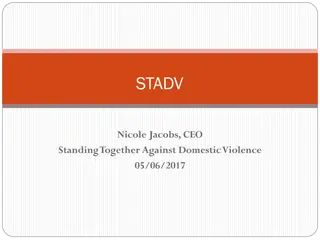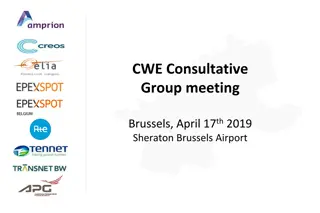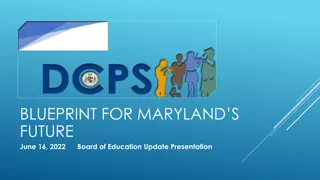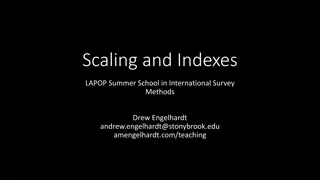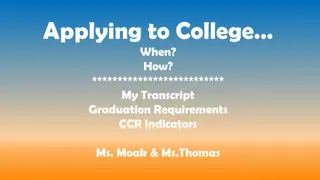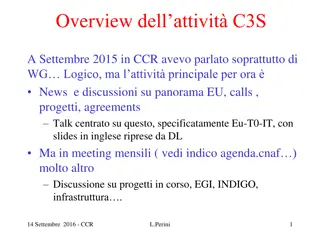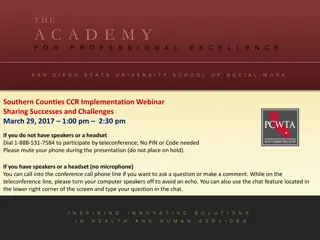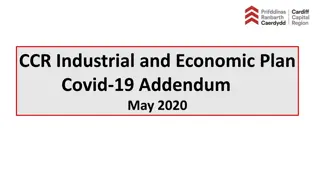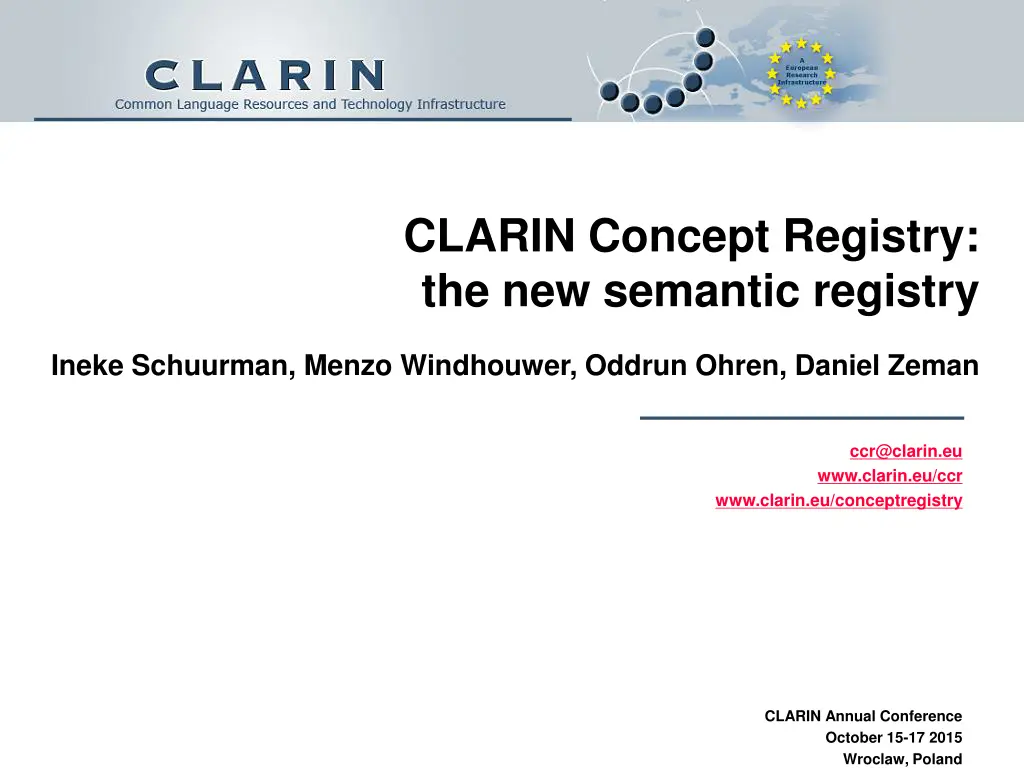
CLARIN Concept Registry: Enhanced Semantic Metadata Management
Gain insights into the new semantic registry, the CLARIN Concept Registry (CCR), designed to improve metadata clarity and quality in CMDI profiles by simplifying and controlling entry submissions. Learn about the transition from ISOcat and the benefits of the new CCR approach for managing high-quality concepts and definitions.
Download Presentation

Please find below an Image/Link to download the presentation.
The content on the website is provided AS IS for your information and personal use only. It may not be sold, licensed, or shared on other websites without obtaining consent from the author. If you encounter any issues during the download, it is possible that the publisher has removed the file from their server.
You are allowed to download the files provided on this website for personal or commercial use, subject to the condition that they are used lawfully. All files are the property of their respective owners.
The content on the website is provided AS IS for your information and personal use only. It may not be sold, licensed, or shared on other websites without obtaining consent from the author.
E N D
Presentation Transcript
CLARIN Concept Registry: the new semantic registry Ineke Schuurman, Menzo Windhouwer, Oddrun Ohren, Daniel Zeman ccr@clarin.eu www.clarin.eu/ccr www.clarin.eu/conceptregistry CLARIN Annual Conference October 15-17 2015 Wroclaw, Poland
Background In the tools and resources offered by CLARIN many (de facto) standards are being referred to, concerning both metadata and content data, but What do they mean? Do they mean the same in the various tools and resources? CMDI (CLARIN Metadata Infrastructure) Makes use of several registries
Clear metadata The metadata provided in CMDI should be clear, i.e., unambiguous, in order to be useful. The building blocks, components, elements, attributes and values, of a CMDI profile should be clearly defined in a Concept or, for value ranges, Vocabulary registry. Registries used: - Dublin Core - ISOcat (in the past) - CLARIN Concept Registry (CCR) - CLAVAS (in the future, CMDI 1.2)
Drawbacks ISOcat - Too much proliferation - everybody could enter stuff - entries quite often not meeting our standards - entries were out of control - Too complex - data category type, data type - while several problematic fields were not useful for our (CLARIN) purposes In addition: last year ISOcat had to be migrated (decision Registration Authority) and became static CLARIN decided to look for another solution.
New approach: CCR CCR (CLARIN Concept Registry) SIMPLIFIED CONTROLLED Simplified: several fields not adopted from ISOcat Controlled: national CCR-coordinators will filter the input http://www.clarin.eu/conceptregistry/
Characteristics CCR Browser: Editor: Accessible for everybody Just for CCR-coordinators to insert new entries API: For tools, e.g., the Component Registry Browser: easy search for Label (name) Definition Other text fields (example, history, )
High quality concepts Definitions should be as general as possible, as specific as necessary , therefore they should be 1. Unique 2. Meaningful 3. Reusable 4. Concise 5. Unambiguous Also in other fields characteristic nr 5 is to be obeyed!
Entries are for ever Trust and reliability Issue in ISOcat! CCR controlled Definitions cannot be updated in a way that changes their meaning Only typos etc can be corrected Preferred label (name) will not be changed Instead a new entry will be created, the old one being expired if necessary what can be added: examples, alternative labels, higher status, notes, additional scheme and/or collection
OpenSKOS Existing OpenSKOS infrastructure was adapted. Already available API to access, create, share thesauri and vocabularies Editor New Concepts have a handle as Persistent Identifier Faceted browser Support for SKOS collections Shibboleth-based access
From ISOcat to the CCR Imported in CCR - Entries used in CLARIN, e.g., in CMDI - Entries recognized as belonging to a standard - Entries selected by the national CCR coordinators ISOcat: over 5000 entries CCR: 3139 entries (for CLARIN) We will perform a clean-up action before adding new entries, in order to remove duplications, project or language specific definitions, empty definitions, misspellings (organization vs organisation),
CCR Coordinators If you need a new concept, or want to change an existing concept contact your CCR coordinator: http://clarin.eu/content/concept-registry-coordinators If no CCR coordinator is appointed for your country: ccr@clarin.eu For information on the CCR, the coordinators and the (upcoming) procedures see http://www.clarin.eu/ccr
Decision procedure All ERIC countries appointed a CCR content coordinator Wrt decisions about entries All CCR content coordinators (or deputies) are involved We aim for unanimity If necessary we will vote A change in CCR (like adding specific new entry) is accepted when 70% or more of the coordinators represented agree All changes are recorded in the CLARIN CCR-section
Correction current entries, new entries There still are incorrect entries, i.e., entries not meeting our demands We are working on these. In the future we will have 2 weeks to come to an agreement on a batch of entries, The same holds wrt proposals for new entries Exceptions: holiday season, and the initial period (=now!)
Moving to the CCR If you have resources that contain references to ISOcat data categories which you want to replace by their CCR concept handles (if available), or want to know which ISOcat data categories are imported into the CCR Visit https://github.com/TheLanguageArchive/ISOcat2CCR where you can find mapping files, and a tool to use those files to replace ISOcat data category references by CCR concent handles If you run into problems contact your national CCR coordinator or, if necessary, ccr@clarin.eu
Thank you for your attention ! (There will be a demo later today)

